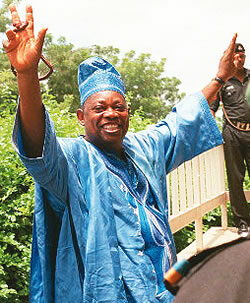
MKO Abiola was not declared the winner of the 1993 presidential elections.
Democracy Day is one of the most important days in the history of Nigeria and it used to be celebrated every May 29 until June 6, 2018, when the immediate past administration of President Muhammadu Buhari, declared June 12 as the new Democracy Day, in order to commemorate the events of the day of the presidential election in 1993 where results indicated a win for MKO Abiola of the Social Democratic Party (SDP), against Bashir Tofa of the National Republican Convention (NRC). Abiola was never declared winner as the then Head Of State General Ibrahim Badamosi Babangida annulled the polls citing irregularities.
In his statement, five years ago, former President Buhari said, “June 12, 1993, was the day when Nigerians in millions expressed their democratic will in what was undisputedly the freest, fairest and most peaceful election since our independence. The fact that the outcome of that election was not upheld by the then military government does not distract from the democratic credentials of that process. Accordingly, after due consultations, the federal government has decided that henceforth, June 12 will be celebrated as Democracy Day.’’
What happened on June 12th, 1993, and why is it important to Nigeria’s history?
- On this day, Nigeria held its first presidential elections after the military coup of 1983 which was headed by Ibrahim Badamasi Babangida.
- The June 12 election is considered the freest and most peaceful election since Nigeria’s independence in 1960.
- The counting process of the elections by the National Electoral Commission revealed a victory for MKO Abiola, as he already won 19 out of the 30 states, and the Federal Capital Territory.
- However, the elections were annulled by Ibrahim Babaginda and no winner was declared. The annulment led to political unrest and several protests erupted across the country.
- In June 1994, Abiola declared himself the President and Commander-in-Chief. He was then arrested and charged with treason. On July 7, 1998, Abiola died while in detention on the day he was supposed to be released.
- Ibrahim Babangida resigned as the Head of State and Ernest Shonekan emerged as the head of the interim government. Not long after, Shonekan’s administration was overthrown by General Sani Abacha.
- Abacha died on June 8, 1998, a month prior to Abiola’s death.
- Before President Buhari’s declaration, June 12 used to be celebrated as “Abiola Day” mostly in the Southwestern part of Nigeria as a remembrance of MKO Abiola’s denied presidency.
As part of the efforts made by President Buhari to honour June 12, Abiola was posthumously awarded the highest national honour, the Grand Commander of the Federal Republic (GCFR) while his running mate, Ambassador Babagana Kingibe and the late human rights activist, Chief Gani Fawehinmi, were awarded the second highest national honour, the Grand Commander of the Niger (GCON).
The post Democracy Day: Why June 12th is an Important Date in Nigeria’s History appeared first on BellaNaija - Showcasing Africa to the world. Read today!.
from BellaNaija https://ift.tt/xh7MYq8
via IFTTT
